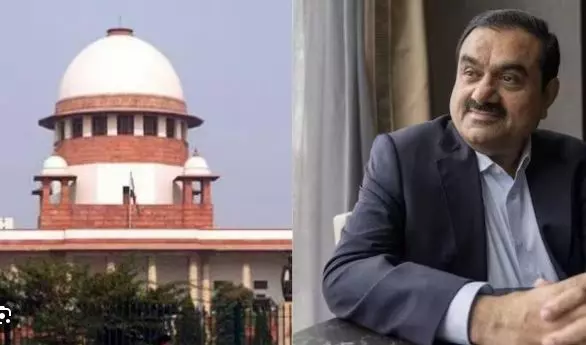
Financial Times journalists get interim protection over case linked to Adani report
text_fieldsNew Delhi: The Supreme Court has granted interim protection to two Financial Times journalists, Benjamin Nicholas Brooke Parkin and Chloe Nina Cornish, who were summoned by the Gujarat Police regarding their article on the Adani Group.
The bench of Justices BR Gavai and Prashant Kumar Mishra issued the notice after the journalists were summoned for a preliminary inquiry based on a complaint from an investor in Adani Group companies.
The article in question, titled "Secret Paper Trail Reveals Hidden Adani Investors," was published on August 31 and alleged that two investors with substantial financial contributions to the Adani Group had close ties to the conglomerate’s promoters.
The report, a result of collaboration between the Financial Times, The Guardian, and the Organised Crime and Corruption Reporting Project, raised concerns about potential violations of Indian stock market rules.
During the court hearing, senior advocate Siddharth Agarwal, representing Parkin and Cornish, clarified that his clients were not the authors of the article; instead, it was penned by Dan McCrum and John Reed. Agarwal expressed dissatisfaction with the petitioners having to approach the Supreme Court directly, citing the inconvenience caused by the Gujarat Police summoning them across state borders.
Agarwal argued that the allegations against Parkin and Cornish amounted to a potential defamation complaint at best, emphasizing that they were willing to provide necessary information but resisted the need for physical travel without legal authority.
This development follows a similar case involving journalists Ravi Nair and Anand Mangnale, who were also granted interim protection by the Supreme Court. The Ahmedabad Crime Branch had issued summons to Nair and Mangnale in connection with the same article, prompting the journalists to question the complainant's credibility.
They highlighted that the complainant had previously faced disciplinary action by the Securities and Exchange Board of India in 2009, raising doubts about their motives.
The Supreme Court has scheduled the matter for further consideration on December 1, acknowledging the complex legal issues surrounding the case and the journalists' concerns about undue harassment.





